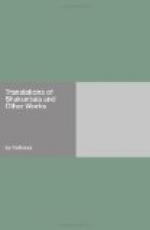Again, the play offers an opportunity for charming scenic display. The terrified nymphs gathered on the mountain, the palace balcony bathed in moonlight, the forest through which the king wanders in search of his lost darling, the concluding solemn consecration of the crown prince by heavenly beings—these scenes show that Kalidasa was no closet dramatist. And finally, there is here and there such poetry as only Kalidasa could write. The fourth act particularly, undramatic as it is, is full of a delicate beauty that defies transcription. It was a new and daring thought—to present on the stage a long lyrical monologue addressed to the creatures of the forest and inspired by despairing passion. Nor must it be forgotten that this play, like all Indian plays, is an opera. The music and the dancing are lost. We judge it perforce unfairly, for we judge it by the text alone. If, in spite of all, the Urvashi is a failure, it is a failure possible only to a serene and mighty poet.
* * * * *
THE DYNASTY OF RAGHU
The Dynasty of Raghu is an epic poem in nineteen cantos. It consists of 1564 stanzas, or something over six thousand lines of verse. The subject is that great line of kings who traced their origin to the sun, the famous “solar line” of Indian story. The bright particular star of the solar line is Rama, the knight without fear and without reproach, the Indian ideal of a gentleman. His story had been told long before Kalidasa’s time in the Ramayana, an epic which does not need to shun comparison with the foremost epic poems of Europe. In The Dynasty of Raghu, too, Rama is the central figure; yet in Kalidasa’s poem there is much detail concerning other princes of the line. The poem thus naturally falls into three great parts: first, the four immediate ancestors of Rama (cantos 1-9); second, Rama (cantos 10-15); third, certain descendants of Rama (cantos 16-19). A somewhat detailed account of the matter of the poem may well precede criticism and comment.
First canto. The journey to the hermitage.—The poem begins with the customary brief prayer for Shiva’s favour:
God Shiva and his mountain bride,
Like word and meaning unified,
The world’s great parents, I beseech
To join fit meaning to my speech.
Then follow nine stanzas in which Kalidasa speaks more directly of himself than elsewhere in his works:
How great is Raghu’s solar line!
How feebly small are powers of mine!
As if upon the ocean’s swell
I launched a puny cockle-shell.
The fool who seeks a poet’s fame
Must look for ridicule and blame,
Like tiptoe dwarf who fain would try
To pluck the fruit for giants high.
Yet I may enter through the door
That mightier poets pierced of yore;
A thread may pierce a jewel, but
Must follow where the diamond cut.




